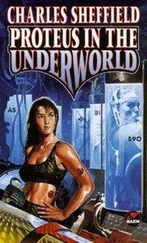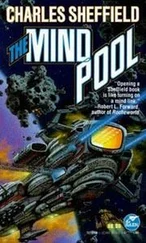“I’ll arrange for you and your guards to travel in a separate part of the Assembly,” I said. “I assume that you will prefer privacy.”
Yifter nodded agreeably, but Bryson wasn’t having any.
“Captain Roker,” he said. “Let me remind you that Mr. Yifter has not been found guilty on any charge. On this journey, and until his trial, he will be treated with proper courtesy. I expect you to house both of us here in the Control Stage, and I expect that you will invite us to take our meals here with you.”
In principle, I could have told him to go and take a walk outside. As captain, I said who would travel in the Control Stage, and who would eat with me — and innocent people were not usually sent to the Titan penal colony, even before their trial. On the other hand, Bryson was from the Planetary Coordinators’ office, and even off-Earth that carried weight. I suppressed my first reaction and said quietly, “What about the guards?”
“They can travel in the Second Section, right behind the Control Stage,” replied Bryson.
I shrugged. If he wanted to make nonsense of Earth’s security efforts, that was his choice. Nothing had ever happened on any of my two-month runs from Earth to Titan, and Bryson was probably quite right; nothing would happen this time. On the other hand, it seemed like a damned silly charade, to ship twenty-five guards to keep an eye on Yifter, then house them in a separate part of the Assembly.
Yifter, with an uncanny empathy, had read through my shrug. “Don’t worry about security, Jeanie Roker,” he said. He smiled again, that tired, soothing smile that began deep in his sad, brown eyes. “You have my assurance, I will be a model prisoner.”
He and Bryson walked on past me, into the main quarters. Was that really Yifter, the bogey-man, the notorious head of the Hallucinogenic Freedom League? It seemed hard to believe. Three months earlier, the Lucies — under Yifter’s messianic direction — had planted hallucinogenic drugs in the water supply lines of most of Earth’s major cities. An eighth of the world had died in the resulting chaos. Starvation, epidemic, exposure, and mindless combat had revisited the Earth and exacted their age-old tribute. The monster who had conceived, planned, and directed that horror was difficult to match with Yifter, the seemingly mild and placid man.
My thoughts were quickly diverted to more immediate practical matters. We had the final masses of all the cargo, and it was time for the final balancing of the whole Assembly. One might assume that just means balancing the kernels correctly, since they out-mass everything else by a factor of a million. But each Section containing a kernel has an independent drive unit, powered by the kernel itself. We leave those on Titan, and travel back light, but on the trip out the dynamic balancing is quite tricky.
I reviewed the final configuration, then looked around for McAndrew. I wanted him to review the balance calculations. It’s my responsibility, but he was the kernel expert. I realized that he hadn’t been present when Yifter came aboard. Presumably he was over on one of the other Sections, crooning over his beloved power sources.
I found him in Section Seven. The Assembly is made up of a variable number of Sections, and there would be twelve on this trip, plus the Control Stage. Until we accelerate away from the Libration Colony station, all the Sections are physically connected — with actual cables — to each other and to the Control Stage. In flight, the coupling is done electromagnetically, and the drives for the powered Sections are all controlled by a computer on the Control Stage. The Assembly looks like a small bunch of grapes, but the stalks are nonfunctional — there are no cables in the System that could take the strains, even at lowest acceleration. Moving among the spherical Sections when we’re in flight isn’t easy. It means we have to cut the drives, and turn off the coupling between the Sections. That’s why I thought the idea of having Yifter’s guards in a different Section was so dumb — from there, they couldn’t even reach the Control Stage when the drives were on.
I wanted McAndrew to check the configuration that we would hold in flight, to see if he agreed that the stresses were decently balanced among the different Sections. We never run near the limit on any of them, but there’s a certain pride of workmanship in getting them all approximately equal, and the stresses as low as possible.
He was standing on the ten-meter shield that surrounded the Section Seven kernel, peering through a long boresight pointed in towards the center. He was aware of my presence but did not move or speak until the observation was complete. Finally he nodded in satisfaction, closed the boresight cap, and turned to me.
“Just checking the optical scalars,” he said. “Spun up nicely, this one. So, what can I do for you, Jeanie?”
I led him outside the second shield before I handed him the trim calculations. I know a kernel shield has never failed, but I’m still not comfortable when I get too close to one. I once asked McAndrew how he felt about working within ten meters of Hell, where you could actually feel the gravity gradient and the inertial dragging. He looked at me with his little, introspective smile, and made a sort of throat-clearing noise — the only trace of his ancestry that I could ever find in him.
“Och,” he said. “The shields are triply protected. They won’t fail.”
That would have reassured me, but then he had rubbed his high, balding forehead and added, “And if they do, it won’t make any difference if you are ten meters away, or five hundred. That kernel would radiate at about two gigawatts, most of it high-energy gammas.”
The trouble was, he always had the facts right. When I first met McAndrew, many years ago, we were taking the first shipment of kernels out to Titan. He had showed up with them, and I assumed that he was just another engineer — a good one, maybe, but I expected that. Five minutes of conversation with him told me that he had probably forgotten more about Kerr-Newman black holes — kernels — than I was ever likely to learn. I have degrees in Electrical Engineering and Gravitational Engineering, in my job I have to, but I’m really no gravity specialist. I felt like an idiot after our first talk. I made a few inquiries, and found that McAndrew was a full professor at the Penrose Institute, and probably the System’s leading expert on space-time structure.
When we got to know each other better, I asked him why he would give up his job for four months of the year, to ride herd on a bunch of kernels being shipped around the Solar System. It was a milk-run, with lots of time and very little to do. Most people would be bored silly.
“I need it,” he said simply. “It’s very nice to work with colleagues, but in my line of business the real stuff is mostly worked out alone. And I can do experiments here that wouldn’t be allowed back home.”
After that, I accepted his way of working, and took vicarious pride in the stream of papers that appeared from McAndrew at the end of each Titan run. He was no trouble on the trips. He spent most of his time in the Sections carrying the kernels, only appearing in the Control Stage for his meals — and frequently missing them. He was a tinkerer as well as a theorist. Isaac Newton was his idol. His work had paid off in higher shielding efficiencies, better energy extraction methods, and more sensitive manipulation of the charged kernels. Each trip, we had something new.
I left the trim calculations with him, and he promised to check them over and give me his comments in an hour or two. I had to move along and check the rest of the cargo.
“By the way,” I said, elaborately casual as I turned to go. “We’ll be having company for dinner on this trip. Bryson insists that Yifter should eat with us.”
Читать дальше












